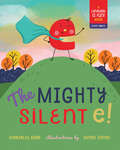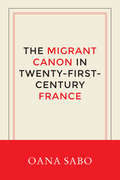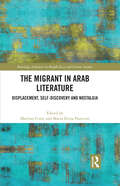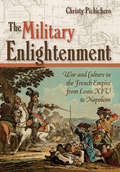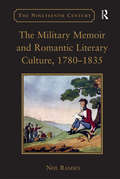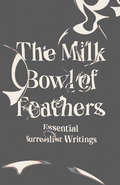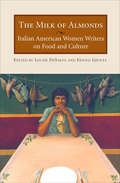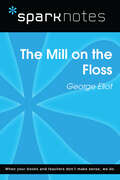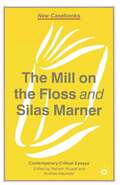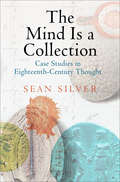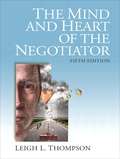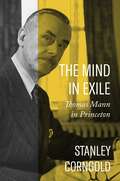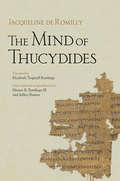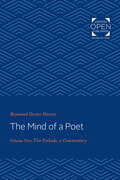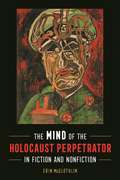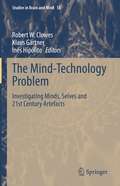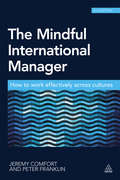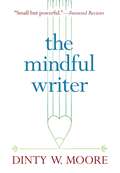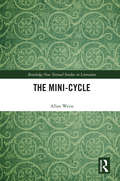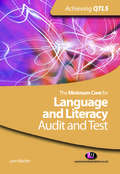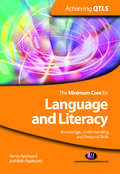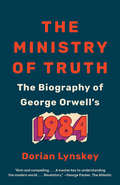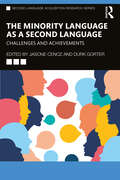- Table View
- List View
The Mighty Silent e!
by Kimberlee GardFrom the Language is Fun Series, learn how the silent 'e' may be overlooked by some but matters more than they think!
The Migrant Canon in Twenty-First-Century France
by Oana SaboThe Migrant Canon in Twenty-First-Century France explains the causes of twenty-first-century global migrations and their impact on French literature and the French literary establishment. A marginal genre in 1980s France, since the turn of the century “migrant literature” has become central to criticism and publishing. Oana Sabo addresses previously unanswered questions about the proliferation of contemporary migrant texts and their shifting themes and forms, mechanisms of literary legitimation, and notions of critical and commercial achievement. Through close readings of novels (by Mathias Énard, Milan Kundera, Dany Laferrière, Henri Lopès, Andreï Makine, Éric-Emmanuel Schmitt, Alice Zeniter, and others) and sociological analyses of their consecrating authorities (including the Prix littéraire de la Porte Dorée, the Académie française, publishing houses, and online reviewers), Sabo argues that these texts are best understood as cultural commodities that mediate between literary and economic forms of value, academic and mass readerships, and national and global literary markets. By examining the latest literary texts and cultural agents not yet subjected to sufficient critical study, Sabo contributes to contemporary literature, cultural history, migration studies, and literary sociology.
The Migrant in Arab Literature: Displacement, Self-Discovery and Nostalgia (Routledge Advances in Middle East and Islamic Studies)
by Maria Elena Paniconi Martina CensiThis edited book offers a collection of fresh and critical essays that explore the representation of the migrant subject in modern and contemporary Arabic literature and discuss its role in shaping new forms of transcultural and transnational identities. The selection of essays in this volume offers a set of new insights on a cluster of tropes: self-discovery, alienation, nostalgia, transmission and translation of knowledge, sense of exile, reconfiguration of the relationship with the past and the identity, and the building of transnational identity. A coherent yet multi-faceted narrative of micro-stories and of transcultural and transnational Arab identities will emerge from the essays: the volume aims at reversing the traditional perspective according to which a migrant subject is a non-political actor. In contrast to many books about migration and literature, this one explores how the migrant subject becomes a specific literary trope, a catalyst of modern alienation, displacement, and uncertain identity, suggesting new forms of subjectification. Multiple representations of the migrant subject inform and perform the possibility of new post- national and transcultural individual and group identities and actively contribute to rewriting and decolonizing history.
The Military Enlightenment: War and Culture in the French Empire from Louis XIV to Napoleon
by Christy L. PichicheroThe Military Enlightenment brings to light a radically new narrative both on the Enlightenment and the French armed forces from Louis XIV to Napoleon. Christy Pichichero makes a striking discovery: the Geneva Conventions, post-traumatic stress disorder, the military "band of brothers," and soldierly heroism all found their antecedents in the eighteenth-century French armed forces.Readers of The Military Enlightenment will be startled to learn of the many ways in which French military officers, administrators, and medical personnel advanced ideas of human and political rights, military psychology, and social justice.
The Military Memoir and Romantic Literary Culture, 1780–1835 (The Nineteenth Century Series)
by Neil RamseyExamining the memoirs and autobiographies of British soldiers during the Romantic period, Neil Ramsey explores the effect of these as cultural forms mediating warfare to the reading public during and immediately after the French Revolutionary and Napoleonic wars. Forming a distinct and commercially successful genre that in turn inspired the military and nautical novels that flourished in the 1830s, military memoirs profoundly shaped nineteenth-century British culture's understanding of war as Romantic adventure, establishing images of the nation's middle-class soldier heroes that would be of enduring significance through the nineteenth and twentieth centuries. As Ramsey shows, the military memoir achieved widespread acclaim and commercial success among the reading public of the late Romantic era. Ramsey assesses their influence in relation to Romantic culture's wider understanding of war writing, autobiography, and authorship and to the shifting relationships between the individual, the soldier, and the nation. The memoirs, Ramsey argues, participated in a sentimental response to the period's wars by transforming earlier, impersonal traditions of military memoirs into stories of the soldier's personal suffering. While the focus on suffering established in part a lasting strand of anti-war writing in memoirs by private soldiers, such stories also helped to foster a sympathetic bond between the soldier and the civilian that played an important role in developing ideas of a national war and functioned as a central component in a national commemoration of war.
The Milk Bowl of Feathers: Essential Surrealist Writings
by Mary Ann CawsAn exciting new collection of the essential writings of surrealism, the European avant-garde movement of the mind’s deepest powers Originating in 1916 with the avant-garde Dada movement at the famous Café Voltaire in Zurich, surrealism aimed to unleash the powers of the creative act without thinking. Max Ernst, André Breton, Tristan Tzara, Paul Éluard, Philippe Soupault, and Louis Aragon created a movement that spread wildly to all corners of the globe, inspiring not only poetry but also artists like Joan Miro and René Magritte and cinematic works by Antonin Artaud, Luis Bunuel, and Salvador Dalí. As the editor, Mary Ann Caws, says, “Essential to surrealist behavior is a constant state of openness, of readiness for whatever occurs, whatever marvelous object we might come across, manifesting itself against the already thought, the already lived.” Here are the gems of this major, mind-bending aesthetic, political, and humane movement: writers as diverse as Aragon, Breton, Dalí, René Char, Robert Desnos, Mina Loy, Paul Magritte, Alice Paalen, Gisele Prassinos, Man Ray, Kay Sage, and Elsa von Freytag-Loringhoven are included here, providing a grand picture of this revolutionary movement that shocked the world.
The Milk of Almonds: Italian American Women Writers on Food and Culture
by Edited by Louise DeSalvo and Edvige Giunta&“A vast, thoroughly wonderful assortment of poetry, memoirs and stories . . . that defines today&’s female Italian-American experience&” (Publishers Weekly). Often stereotyped as nurturing others through food, Italian-American women have often struggled against this simplistic image to express the realities of their lives. In this unique collection, over 50 Italian-American female writers speak in voices that are loud, boisterous, sweet, savvy, and often subversively funny. Drawing on personal and cultural memories rooted in experiences of food, they dissolve conventional images, replacing them with a sumptuous, communal feast of poetry, stories, and memoir. This collection also delves into unexpected, sometimes shocking terrain as these courageous authors bear witness to aspects of the Italian American experience that normally go unspoken—mental illness, family violence, incest, drug addiction, AIDS, and environmental degradation. As provocative as it is appetizing, &“this collection of verse and prose pieces . . . reveals the evocative and provocative power of food as event and as symbol, as well as the diversity of these women&’s lives and their ambivalence regarding the role of nurturer&” (Library Journal).
The Mill on the Floss (SparkNotes Literature Guide Series)
by SparkNotesThe Mill on the Floss (SparkNotes Literature Guide) by George Eliot Making the reading experience fun!Created by Harvard students for students everywhere, SparkNotes is a new breed of study guide: smarter, better, faster. Geared to what today's students need to know, SparkNotes provide:Chapter-by-chapter analysisExplanations of key themes, motifs, and symbolsA review quiz and essay topicsLively and accessible, these guides are perfect for late-night studying and writing papers.
The Mill on the Floss and Silas Marner
by Nahem Yousaf Andrew MaunderThis New Casebook explores the enduring significance of George Eliot's novels The Mill on the Floss (1860) and Silas Marner (1861). Eliot's radical cultural politics and the arrestingly original fictional strategies that characterise two of her most popular novels are explored from a variety of perspectives - feminist, historicist, structuralist and psychoanalytic.
The Mind Is a Collection: Case Studies in Eighteenth-Century Thought (Material Texts)
by Sean SilverJohn Locke described the mind as a cabinet; Robert Hooke called it a repository; Joseph Addison imagined a drawer of medals. Each of these philosophers was an avid collector and curator of books, coins, and cultural artifacts. It is therefore no coincidence that when they wrote about the mental work of reason and imagination, they modeled their powers of intellect in terms of collecting, cataloging, and classification.The Mind Is a Collection approaches seventeenth- and eighteenth-century metaphors of the mind from a material point of view. Each of the book's six chapters is organized as a series of linked exhibits that speak to a single aspect of Enlightenment philosophies of mind. From his first chapter, on metaphor, to the last one, on dispossession, Sean Silver looks at ways that abstract theories referred to cognitive ecologies—systems crafted to enable certain kinds of thinking, such as libraries, workshops, notebooks, collections, and gardens. In doing so, he demonstrates the crossings-over of material into ideal, ideal into material, and the ways in which an idea might repeatedly turn up in an object, or a range of objects might repeatedly stand for an idea. A brief conclusion examines the afterlife of the metaphor of mind as collection, as it turns up in present-day cognitive studies. Modern cognitive theory has been applied to the microcomputer, and while the object is new, the habit is as old as the Enlightenment.By examining lived environments and embodied habits from 1660 to 1800, Silver demonstrates that the philosophical dualism that separated mind from body and idea from thing was inextricably established through active engagement with crafted ecologies.
The Mind and Heart of the Negotiator (5th Edition)
by Leigh ThompsonDelve into the mind and heart of the negotiator in order to enhance negotiation skills. The Mind and Heart of the Negotiator is dedicated to negotiators who want to improve their ability to negotiate--whether in multimillion-dollar business deals or personal interactions. This text provides an integrated view of what to do and what to avoid at the bargaining table, facilitated by an integration of theory, scientific research, and practical examples. This edition contains new examples and chapter-opening sections, as well as more than a hundred new scientific articles on negotiations.
The Mind in Exile: Thomas Mann in Princeton
by Stanley CorngoldA unique look at Thomas Mann’s intellectual and political transformation during the crucial years of his exile in the United StatesIn September 1938, Thomas Mann, the Nobel Prize–winning author of Death in Venice and The Magic Mountain, fled Nazi Germany for the United States. Heralded as “the greatest living man of letters,” Mann settled in Princeton, New Jersey, where, for nearly three years, he was stunningly productive as a novelist, university lecturer, and public intellectual. In The Mind in Exile, Stanley Corngold portrays in vivid detail this crucial station in Mann’s journey from arch-European conservative to liberal conservative to ardent social democrat.On the knife-edge of an exile that would last fully fourteen years, Mann declared, “Where I am, there is Germany. I carry my German culture in me.” At Princeton, Mann nourished an authentic German culture that he furiously observed was “going to the dogs” under Hitler. Here, he wrote great chunks of his brilliant novel Lotte in Weimar (The Beloved Returns); the witty novella The Transposed Heads; and the first chapters of Joseph the Provider, which contain intimations of his beloved President Roosevelt’s economic policies. Each of Mann’s university lectures—on Goethe, Freud, Wagner—attracted nearly 1,000 auditors, among them the baseball catcher, linguist, and O.S.S. spy Moe Berg. Meanwhile, Mann had the determination to travel throughout the United States, where he delivered countless speeches in defense of democratic values.In Princeton, Mann exercised his “stupendous capacity for work” in a circle of friends, all highly accomplished exiles, including Hermann Broch, Albert Einstein, and Erich Kahler. The Mind in Exile portrays this luminous constellation of intellectuals at an extraordinary time and place.
The Mind of Thucydides (Cornell Studies in Classical Philology #62)
by Jacqueline de RomillyThe publication of Jacqueline de Romilly’s Histoire et raison chez Thucydide in 1956 virtually transformed scholarship on Thucydides. Rather than mining The Peloponnesian War to speculate on its layers of composition or second-guess its accuracy, it treated it as a work of art deserving rhetorical and aesthetic analysis. Ahead of its time in its sophisticated focus upon the verbal texture of narrative, it proved that a literary approach offered the most productive and nuanced way to study Thucydides. Still in print in the original French, the book has influenced numerous Classicists and historians, and is now available in English for the first time in a careful translation by Elizabeth Trapnell Rawlings. The Cornell edition includes an introduction by Hunter R. Rawlings III and Jeffrey Rusten tracing the context of this book’s original publication and its continuing influence on the study of Thucydides.Romilly shows that Thucydides constructs his account of the Peloponnesian War as a profoundly intellectual experience for readers who want to discern the patterns underlying historical events. Employing a commanding logic that exercises total control over the data of history, Thucydides uses rigorous principles of selection, suggestive juxtapositions, and artfully opposed speeches to reveal systematic relationships between plans and outcomes, impose meaning on the smallest events, and insist on the constant battle between intellect and chance. Thucydides’ mind found in unity and coherence its ideal of historical truth.
The Mind of a Poet: A Study of Wordsworth's Thought with Particular Reference to "The Prelude"
by Raymond Dexter HavensOriginally published in 1941. This book stresses the transcendental, rather than purely aesthetic, qualities of William Wordsworth's work. It argues that the unusual aspects of Wordsworth's mind are not isolated and did not seem to him fanciful or merely personal; they were, for him, so many paths, difficult to find and harder to follow, yet leading to the great central truth that is the goal of all humankind's loftier strivings.
The Mind of a Poet: The Prelude, Commentary
by Raymond Dexter HavensThis book seeks to study the mind of a poet, specifically by picking William Wordsworth as a case study. The reason for signaling out Wordsworth as the person in whom to study the mind of a poet is that The Prelude reveals with unusual fullness a mind that is fundamentally poetic. Even its peculiarities, its numerous limitations, and its unusual emphases are in the main those of a poet. Besides, poetry—not, as with many other writers, religious or social problems, humanitarianism, science, politics, economics, metaphysics, or literary criticism—was the chief concern of his creative years. Further, the sheer amount of verse, criticism, letters, and journals Wordsworth produced makes him an excellent choice for a study of this kind.
The Mind of the Holocaust Perpetrator in Fiction and Nonfiction
by Erin McGlothlinThe Mind of the Holocaust Perpetrator in Fiction and Nonfiction examines texts that portray the inner experience of Holocaust perpetrators and thus transform them from archetypes of evil into complex psychological and moral subjects. Employing relevant methodological tools of narrative theory, Erin McGlothlin analyzes these unsettling depictions, which manifest a certain tension regarding the ethics of representation and identification. Such works, she asserts, endeavor to make transparent the mindset of their violent subjects, yet at the same time they also invariably contrive to obfuscate in part its disquieting character. The Mind of the Holocaust Perpetrator in Fiction and Nonfiction contains two parts. The first focuses on portraits of real-life perpetrators in nonfictional interviews and analyses from the 1960s and 1970s. These works provide a nuanced perspective on the mentality of the people who implemented the Holocaust via the interventional role of the interviewer or interpreter in the perpetrators’ performances of self-disclosure. In part two, McGlothlin investigates more recent fictional texts that imagine the perspective of their invented perpetrator-narrators. Such works draw readers directly into the perpetrator’s experience and at the same time impede their access to the perpetrator’s consciousness by retarding their affective connection. Demonstrating that recent fiction featuring perpetrators as narrators employs strategies derived from earlier nonfictional portrayals, McGlothlin establishes not only a historical connection between these two groups of texts, whereby nonfictional engagement with real-life perpetrators gradually gives way to fictional exploration, but also a structural and aesthetic one. The book bespeaks new modes of engagement with ethically fraught questions raised by our increasing willingness to consider the events of the Holocaust from the perspective of the perpetrator. Students, scholars, and readers of Holocaust studies and literary criticism will appreciate this closer look at a historically taboo topic.
The Mind-Technology Problem: Investigating Minds, Selves and 21st Century Artefacts (Studies in Brain and Mind #18)
by Inês Hipólito Robert W. Clowes Klaus GärtnerThis edited book deepens the engagement between 21st century philosophy of mind and the emerging technologies which are transforming our environment. Many new technologies appear to have important implications for the human mind, the nature of our cognition, our sense of identity and even perhaps what we think human beings are. They prompt questions such as: Would an uploaded mind be 'me'? Does our reliance on smart phones, or wearable gadgets enhance or diminish the human mind? and: How does our deep reliance upon ambient artificial intelligence change the shape of the human mind? Readers will discover the best philosophical analysis of what current and near future 21st technology means for the metaphysics of mind. Important questions are addressed on matters relating to the extended mind and the distributed self. Expert authors explore the role that the ubiquitous smart phone might have in creating new forms of self-knowledge. They consider machine consciousness, brain enhancement and smart ambient technology, and what they can tell us about phenomenal consciousness. While ideas of artificial general intelligence, cognitive enhancements and the smart environment are widely commented on, serious analysis of their philosophical implications is only getting started. These contributions from top scholars are therefore very timely, and are of particular relevance to students and scholars of the philosophy of mind, philosophy of technology, computer science and psychology.
The Mindful International Manager
by Peter Franklin Jeremy ComfortThe Mindful International Manager tackles the management situations that international managers have to handle every day. Accessible and jargon-free it explains how to clarify local vs. international roles, support and develop a team, organize and coordinate boundaries of time and distance, and win commitment toward common goals. The authors, both interculturalists, include exercises and best practice advice and the experiences and insights of practising international managers. They combine their practical approach with great depth of insight into the challenges of working and managing internationally and include the results of new research findings and cutting-edge case studies on topics such as leadership, global nomads, cultural hybridity, virtual teams, coaching and mentoring across cultures and decision-making.
The Mindful Writer
by Dinty W. MooreGoing beyond the typical "how to write" book, The Mindful Writer illuminates the creative process: where writing and creativity originate, how mindfulness plays into work, how to cultivate good writing habits, how to grow as a writer and a person, and what it means to live a life dedicated to the craft of writing. There's not a writer alive, novice or master, who will not benefit from this book and fall in love with it. Cover to cover, this wise little book is riveting and delightful. The Mindful Writer will be a book that readers will turn to again and again as a source inspiration, guidance, and support.
The Mini-Cycle (Routledge New Textual Studies in Literature)
by Allan WeissWhile scholars have been studying the short story cycle for some time now, this book discusses a form that has never before been identified and named, let alone analyzed: the mini-cycle. A mini-cycle is a short story cycle made up, in most cases, of only two or three stories. This study looks at mini-cycles spanning the period from Anton Chekhov’s "little trilogy" (1898) to the "Alphinland" stories in Margaret Atwood’s Stone Mattress (2014), including texts by such authors as Stephen Leacock, Alice Munro, Robert Olen Butler, and Clark Blaise. Consideration is also given to marginal examples, like Sherwood Anderson’s "Godliness—A Tale in Four Parts" (1919), which can be seen as one story or four distinct texts unified under one title, and to what is called the "exploded" mini-cycle: one whose component stories are published with intervening stories between them rather than consecutively. For each mini-cycle, the analysis is based on close reading of both the linking elements—character, imagery, symbolism, and so forth—and the rhetorical and aesthetic effects of the mini-cycle’s being made up of distinct stories rather than constructed as one long narrative.
The Minimalist Program
by Fahad Rashed Al-MutairiThe development of the Minimalist Program (MP), Noam Chomsky's most recent generative model of linguistics, has been highly influential over the last twenty years. It has had significant implications not only for the conduct of linguistic analysis itself, but also for our understanding of the status of linguistics as a science. The reflections and analyses in this book contain insights into the strengths and the weaknesses of the MP. Among these are, a clarification of the content of the Strong Minimalist Thesis (SMT); a synthesis of Chomsky's linguistic and interdisciplinary discourses; and an analysis of the notion of optimal computation from conceptual, empirical and philosophical perspectives. This book will encourage graduate students and researchers in linguistics to reflect on the foundations of their discipline, and the interdisciplinary nature of the topics explored will appeal to those studying biolinguistics, neurolinguistics, the philosophy of language and other related disciplines.
The Minimum Core for Language and Literacy: Audit And Test (Achieving QTLS Series)
by Lynn MachinThis book supports trainee teachers in the Lifelong Learning Sector in the assessment of their literacy knowledge. A self-audit section is included to help trainees understand their level of competence and confidence in literacy and will help them identify any gaps in their knowledge and skills. This is followed by exercises and activities to support and enhance learning. The book covers all the content of the LLUK standards for the minimum core for literacy. Coverage and assessment of the minimum core have to be embedded in all Certificate and Diploma courses leading to QTLS and ATLS status.
The Minimum Core for Language and Literacy: Knowledge, Understanding And Personal Skills (Achieving QTLS Series)
by Nancy Appleyard Keith AppleyardThe teacher training framework, introduced in September 2007, requires all teachers in the post-16 sector to possess knowledge, understanding and personal skills to at least level 2 in the minimum core for language and literacy. Coverage and assessment of the core has to be embedded in all Certificate and Diploma courses leading to QTLS and ATLS status. This book is a practical guide to language and literacy for trainee teachers in the Lifelong Learning sector. It enables trainee teachers to identify and develop their own language and literacy skills and also to support their students′ language and literacy.
The Ministry of Truth: The Biography of George Orwell's 1984
by Dorian Lynskey"Rich and compelling. . .Lynskey&’s account of the reach of 1984 is revelatory.&”--George Packer, The Atlantic An authoritative, wide-ranging, and incredibly timely history of 1984--its literary sources, its composition by Orwell, its deep and lasting effect on the Cold War, and its vast influence throughout world culture at every level, from high to pop.1984 isn't just a novel; it's a key to understanding the modern world. George Orwell's final work is a treasure chest of ideas and memes--Big Brother, the Thought Police, Doublethink, Newspeak, 2+2=5--that gain potency with every year. Particularly in 2016, when the election of Donald Trump made it a bestseller ("Ministry of Alternative Facts," anyone?). Its influence has morphed endlessly into novels (The Handmaid's Tale), films (Brazil), television shows (V for Vendetta), rock albums (Diamond Dogs), commercials (Apple), even reality TV (Big Brother). The Ministry of Truth is the first book that fully examines the epochal and cultural event that is 1984 in all its aspects: its roots in the utopian and dystopian literature that preceded it; the personal experiences in wartime Great Britain that Orwell drew on as he struggled to finish his masterpiece in his dying days; and the political and cultural phenomena that the novel ignited at once upon publication and that far from subsiding, have only grown over the decades. It explains how fiction history informs fiction and how fiction explains history.
The Minority Language as a Second Language: Challenges and Achievements (Second Language Acquisition Research Series)
by Durk Gorter Jasone CenozThis innovative collection is the first of its kind to showcase global perspectives on learning minority languages as second languages, offering unique insights into their acquisition and specific characteristics and raising greater awareness around other languages and contexts where SLA occurs. The volume examines how minority languages are acquired as second languages across a range of geographic settings where these languages are unique minorities; that is, they are spoken in one or more states where they have a minority status. International case studies explore particular features of these languages as well as the challenges of teaching and learning them, including standardization, legal recognition at all educational levels, the dissemination of printed and digital materials and more or less limited language use in the local community. Highlighted languages include Ashaninka, Basque, Frisian, Hawaiian, Irish, Isthmus Zapotec, Quechua Chanka, Tonga and Welsh. Each chapter adopts a consistent structure, with a brief introduction to the sociolinguistic landscape, followed by sections on language use in education, research studies, reflections and discussions related to the learning of minority languages as second languages and the implication of these processes for the revitalization of minority languages. Breaking new ground in second language acquisition research, this book is an indispensable resource for advanced students and researchers in SLA, multilingual education, bilingualism and sociolinguistics.
